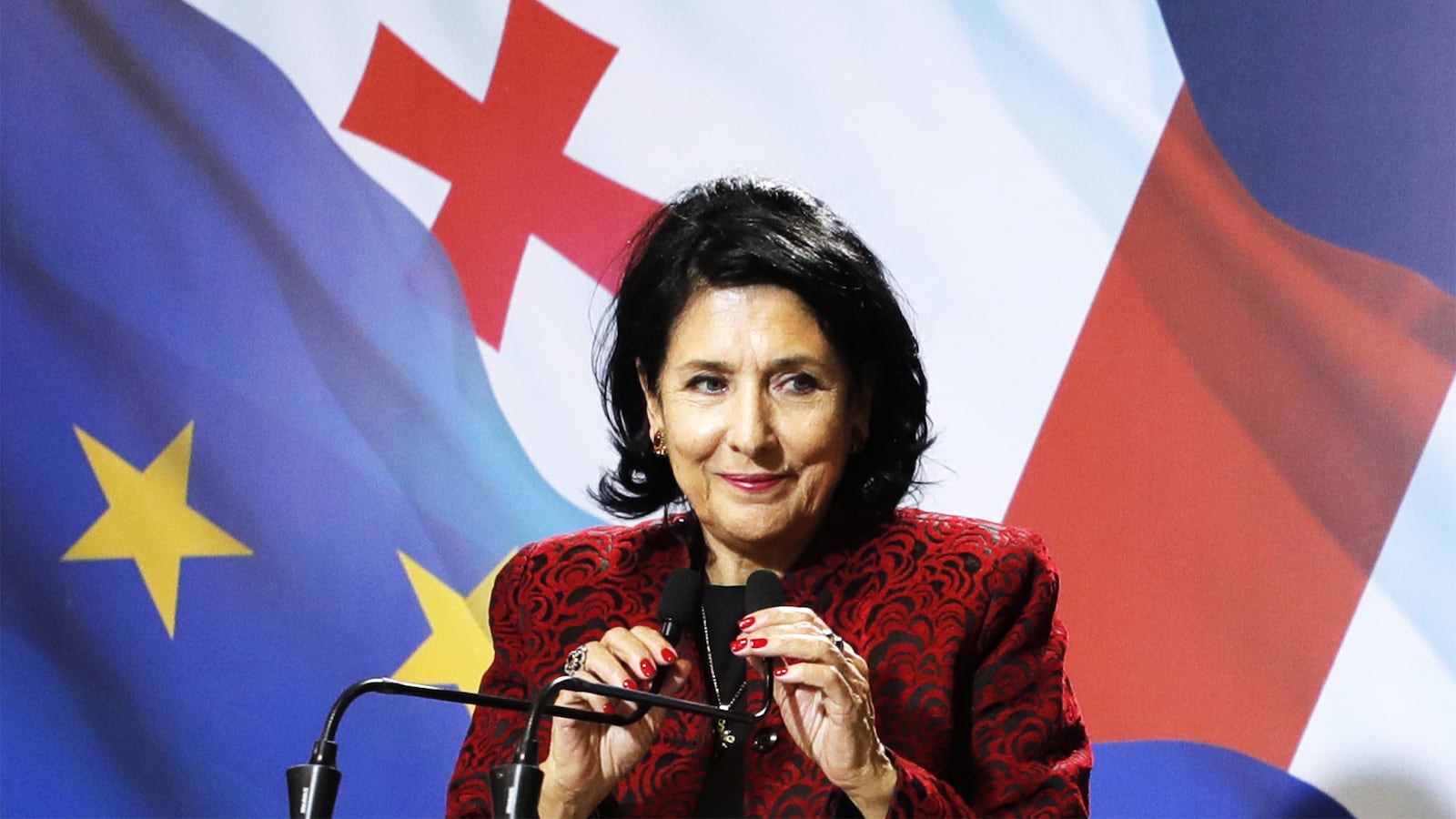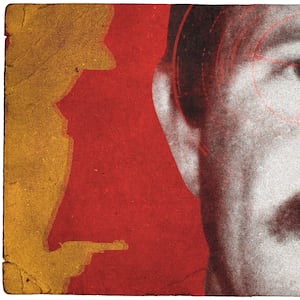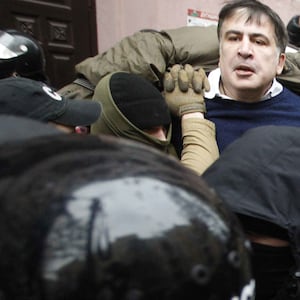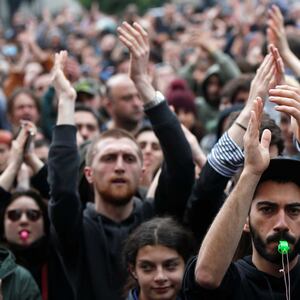TBILISI, Georgia — In the Republic of Georgia and throughout the Caucasus one commonly hears people say, “Be quiet, woman, when a man speaks.” Sexism of the old school is a thing of the present here, and that is exactly why the election of Salome Zurabishvili as the first woman president in the region’s modern history sets an important example. Gender equality was legislated in Georgia a dozen years ago. This would seem, at last, to be proof of concept.
But rejoicing has been restrained. The campaign was vicious, full of calls for violence, savage criticism and death threats, Zurabishvili told The Daily Beast in an exclusive interview soon after the election commission announced she had won with a convincing 59.5 percent of the vote.
Comfortably elegant in a purple velvet jacket as we sat and talked around a table with members of her family, this 66-year-old head of state has a history that bears little resemblance to that of her male rivals.
Zurabishvili did not live a day in the Soviet Union when Georgia was one of the Soviet republics. She was born in Paris, received her education in France and in the United States, then became a French diplomat with postings to Rome, the United Nations, Washington, Tbilisi and Brussels.
She still speaks fluent English with a light French accent and poor Georgian with a thick French accent. That she was able to speak Georgian at all (“an exceptionally difficult” language, according to the U.S. State Department), was thanks to her family of Georgian political emigrés who, through four generations in exile, had kept their faith with this graceful country squeezed between Russia, Iran, Turkey, Armenia, Azerbaijan and the deep Black Sea.
Zurabishvili taught her own children, French citizens, to speak Georgian and love their culture. And then, a few years ago, she decided to become a Georgian politician with one purpose only, she says: to use her knowledge, contacts and experience to help her country, partly occupied by Russian forces, to grow closer to Brussels, Paris, New York and London.
Nothing ever seems easy in Georgia, where society is passionate about pure democracy but torn between a shadowy leader, billionaire Bidzina Ivanishvili and his ruling party on one side, and the opposition led by the exiled ex-president, Mikheil Saakashvili, on the other, with lots of post-Soviet thugs in between.
Zurabashvili once served the latter as foreign minister, and there is little question that the support of the former helped put her over the top in the election. But instead of having friends on both sides, it appears she has enemies, and not least because of her gender.
At least half of the country’s voters disliked the woman candidate for a multitude of reasons, some of them nominal, some perhaps more substantive.
“During the campaign I was attacked for being a ‘Kremlin agent’ and ‘a traitor,’ for not speaking Georgian, for my ‘anti-church views’–all of it was quite painful,” Zurabishvili told The Daily Beast. “Religion, language, devotion to one’s country are the elements defining Georgian identity, the key elements I believe in.”
In August she said that Georgia was “provoked and took the bait,” launching a hugely costly war with Russia in 2008. “A small country like Georgia cannot afford to be provoked,” she said in her presidential campaign announcement. “When you are a small country, you have to be smarter than your enemies.”
That comment made her, in fact, a huge number of enemies, especially among war veterans. “She is a traitor, her words can be used in court against Georgia,” university professor Shota Utiashvili told The Daily Beast. During the war, Utiashvili served as a spokesman for the Ministry of Internal Affairs.
Pulling out her cell phone, the president told The Daily Beast: “They threatened to kill me and my children.” She showed the menacing texts coming from somebody calling himself Giorgi Rusitashvili.
“This person has also sent me death threats,” Zurabishvili’s son, French diplomat Teimuraz Gorjestani, quietly said from across the table. “And to me, too,” Ketevan Gorjestani, the president’s daughter, added. Both of the president’s children were concerned about their mother’s security.
Ketevan worked as a news reporter and sports editor on France 24 TV in Paris. “After what I have seen during this election campaign,” she said, “I know I would never choose to enter politics, never in my life.”
Ex-President Saakashvili, who is living in the Netherlands these days, called for his supporters to revolt against Zurabishvili, claiming there had been “mass electoral fraud.” Hundreds of protesters answered the call and joined the demonstration Sunday on Rustaveli, Tbilisi’s central street.
Before the rally, police arrested seven Ukrainian citizens, including one Georgian war veteran of the ‘Donbas’ battalion, presumably because he fought in the simmering war between Ukraine and Russia. A Georgian Interior Ministry report said that the detainees were suspected of illegal possession of weapons and explosive devices.
Zurabishvili’s daughter and son flew to Georgia from Europe to be by their mother’s side when they realized she was positioned in the middle of a battlefield between two old rivals, billionaire Ivanishvili and ex-president Saakashvili.
“The most bruising thing was that they attacked her on all her fundamental values, accusing her of being pro-Russian, which is ridiculous if you know my family’s history,” the president’s son, Gorjestani, told The Daily Beast.
A recent message on his cell phone: “Don’t you ever set foot in Georgia, I will never allow a Russian traitor to be the president of this country. I will be there in a few days; and if I see you, I will shoot all of you.”
Violent attacks on politicians are not new to Georgia. Last year a car bomb shook up Tbilisi when somebody blew up parliament member Givi Targamadze’s car near Rose Revolution Square.
There is no question, as President Zurabishvili freely admits, that the support of Ivanishvili’s ruling Georgian Dream Party was a key to her election, but she says there were no preconditions requiring here to stay loyal to Ivanishvili and his party in the future. “I saw Mr. Ivanishvili after the elections. He told me: ‘You have no debt to the ruling party, you can be independent.’”
When the new president was in graduate school in the early 1970s at Columbia University, the great Sovietologist Zbigniew Brzezinski (subsequently President Jimmy Carter’s national security adviser) had a powerful influence on her.
Brzezinski, who belonged to the realist school of international relations, was a talented prognosticator. “He was the most impressive teacher; it was there at Columbia University where I learned critical thinking, while in France, where I graduated from school, I learned free thinking.”
As in many parliamentary democracies, her role as president and head of state is largely ceremonial, but Zurabishvili has a clear strategic vision: “The ultimate goal would be to reunify Georgia and enter the European Union, whatever format Europe becomes. We’d like to be a member of the E.U. and NATO, and if not a member, at least become a part of NATO security system.”
“We are not defined by Russia, we have to present something else in today’s world of unpredictability: all round us from Iran to Turkey and Russia the situation can change at any moment,” the president said. “We are an island of stability on the Black Sea–we should try and sell this idea to the outside world.”
The soft-spoken French diplomat Zurabishvili is very different from the impulsive and abrasive Saakashvili, leader of the pro-Western Rose Revolution of 2003. Saakashvili was the West’s darling for years, while reforming Georgia, bringing foreign investments, sacking over 200,000 post-Soviet bureaucrats, turning Georgia from a place without hot water and electricity into an international tourist destination.
In March 2004 Saakashvili appointed Zurabishvili, previously the French ambassador to Georgia, as his first foreign minister, but a year later he fired her for disagreeing with his government. At the time Zurabishvili blamed “Russia-aligned neo-communist” forces for her dismissal.
Today, as the new president of Georgia, Zurabishvili speaks coldly about her former boss: “We should thank Mikheil Saakashvili for the Rose Revolution and reforms of the state; there were many good starts, which unfortunately went astray because of his authoritarian trend.”
The first round of the presidential election was held last month and involved 25 candidates, which looked quite democratic, especially when compared to neighboring Russia, Iran or Azerbaijan, where no opposition has a chance to participate in a fair election process.
It was the second round when things got really ugly: To get Zurabishvili elected, billionaire Ivanishvili threw his money on the table, promising to write off debts for 600,000 voters.
Her critics say that she came to power as a result of “the dirtiest campaign” in Georgia’s history. “The powers that backed her—from political parties to individuals—are among the most xenophobic and sexist on Georgia’s political spectrum,” says Natalia Antelava, Georgian journalist and founder of Coda Story, an international media platform based in Tbilisi. “The ‘First Woman President’ makes a great headline that implies progress, but it was a massive step backward for Georgia’s democratic development.”
Antelava is upset that Georgia’s first woman president appears to be “a finger puppet” for billionaire Ivanishvili.
His ruling party put massive billboards all over Georgia with the faces of its known male leaders, while the name of their candidate, Salome Zurabishvili, was put in small letters underneath. “She would have never won without Ivanishvili’s backing, both political and financial—that’s not an example of a woman leader I’d like to set for my daughter.”
Still, while politicians and journalists argued about the electoral outcome, many Georgian women celebrated Zurabishvili’s victory. On Saturday night a group raised their glasses to their first woman president at Friends House restaurant in Tbilisi’s old town.
“It is unfortunate, but our men are too relaxed, so women carry all the responsibility on their shoulders, take a managing role in all spheres; it does not surprise me that people voted to see a woman for our president,” the restaurant’s owner, Lolita Dzhibgashvili, told The Daily Beast. “Good for her, we are happy to see her victory and we love the fact that she was born in France but still taught her children to speak Georgian.”










